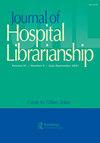成为必不可少的:从创建健康教育网络研讨会系列中学到的经验教训
Q3 Social Sciences
引用次数: 0
摘要
在2020年早春,两个新的名称进入了文化对话,用于描述和区分所有就业人员:必要和非必要。这些标签有助于区分哪些职业、行业和雇员是绝对必要的,以保持最初设计的功能。州和联邦健康指导对非必要员工施加的业务限制,如隔离和在家工作,旨在防止接触和传播COVID-19。医疗保健被认为是关键的基础设施部门之一,但早在2020年4月,就有多达140万医院员工被解雇(1)。医疗图书馆是严重减薪、预算或裁员的医院部门之一。在大流行之前,那些在卫生科学图书馆领域工作了足够长时间的人知道一个不幸的事实,即他们很可能在大流行之前很久就被医院管理人员认为是不必要的。在经济挑战时期,作为非创收实体(如图书馆)的一部分,展示价值的压力不断被图书馆同行重申,在无数在线图书馆员博客中讨论,并在《医院图书馆杂志》等专业期刊上发表的文章中提到(2)。格林威治医院的消费者健康图书馆员是那些有幸继续远程工作而不减少工作时间或薪水的人之一。她意识到,她作为社区卫生信息专家和提供者的责任越来越难以履行,因为医院的探视政策将限制公众进入医院校园。由于公众对医学图书馆的访问受到限制,消费者健康图书管理员预计健康信息搜索请求和图书借阅将大幅减少。此外,她将无法与新老顾客保持重要的联系。本文章由计算机程序翻译,如有差异,请以英文原文为准。
Becoming Essential: Lessons Learned from Creating a Health Education Webinar Series
In early spring 2020, two new designations entered the cultural conversation to describe and differentiate all employed people: essential and non-essential. These labels helped to distinguish which occupations, industries, and employees were absolutely necessary to stay functioning as initially designed. Business restrictions placed on non-essential employees by state and federal health guidance, such as quarantining and working from home, were meant to prevent exposure to and the spread of COVID-19. Healthcare is considered one of those critical infrastructure sectors, yet as many as 1.4 million hospital workers were laid off as early as April 2020 (1). Medical libraries were among those hospital departments that were severely reduced either in salary, budget, or employees. Before the pandemic, those who worked long enough in the field of health science librarianship knew the unfortunate fact that they were most likely considered non-essential by hospital administrators long before the pandemic. The pressure to demonstrate value as part of a non-revenue generating entity such as a library in times of economic challenge is reiterated constantly by library peers, discussed in countless online librarian blogs, and mentioned in articles published in specialized periodicals such as the Journal of Hospital Librarianship (2). While the Consumer Health Librarian at Greenwich Hospital was among those fortunate enough to continue working remotely without reduced hours or pay, she realized that her responsibilities as a community health information expert and provider were becoming harder to accomplish since the hospital’s visitation policy would restrict the public from entering the hospital campus. With restricted public access to the Medical Library, the Consumer Health Librarian anticipated a drastic reduction in health information search requests and book check-outs. Additionally, she would be unable to maintain vital connections with new and returning walk-in patrons.
求助全文
通过发布文献求助,成功后即可免费获取论文全文。
去求助
来源期刊

Journal of Hospital Librarianship
Social Sciences-Library and Information Sciences
CiteScore
1.00
自引率
0.00%
发文量
43
期刊介绍:
The Journal of Hospital Librarianship is the first journal to specifically address the issues and concerns of librarians and information specialists in the field of hospital librarianship. This peer-reviewed journal focuses on technical and administrative issues that most concern hospital librarians, providing a forum for those professionals who organize and disseminate health information to both clinical care professionals and consumers. The Journal addresses a wide variety of subjects that are vital to the field, including administrative, technical and program issues that may challenge hospital librarians. Articles published in the Journal focus on research strategies, administrative assistance, managed care, financing, mergers, and more.
 求助内容:
求助内容: 应助结果提醒方式:
应助结果提醒方式:


